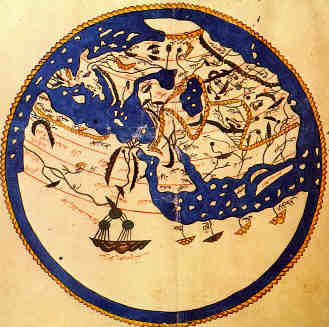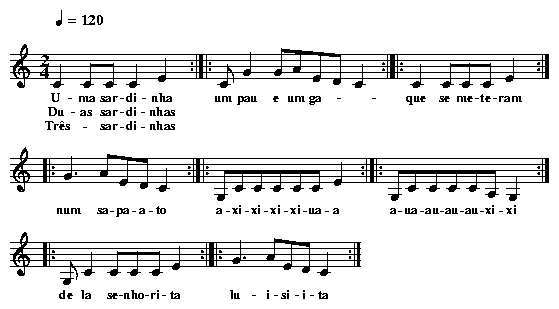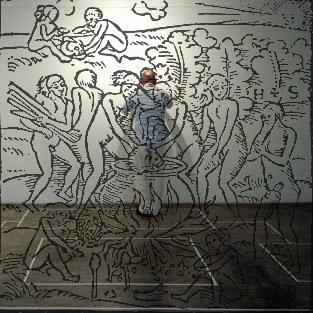
The Voyage of the Beagle, Charles Darwin
Chapter 2 – Rio de Janeiro
* Rio de Janeiro * Excursion north of Cape Frio * Great Evaporation * Slavery * Botofogo Bay * Terrestrial Planariae * Clouds on the Corcovado * Heavy Rain * Musical Frogs * Phosphorescent Insects * Elater, springing powers of * Blue Haze * Noise made by a Butterfly * Entomology * Ants * Wasp killing a Spider * Parasitical Spider * Artifices of an Epeira * Gregarious Spider * Spider with an unsymmetrical Web.
APRIL 4th to July 5th, 1832. — A few days after our arrival I became acquainted with an Englishman who was going to visit his estate, situated rather more than a hundred miles from the capital, to the northward of Cape Frio. I gladly accepted his kind offer of allowing me to accompany him.
April 8th. — Our party amounted to seven. The first stage was very interesting. The day was powerfully hot, and as we passed through the woods, everything was motionless, excepting the large and brilliant butterflies, which lazily fluttered about. The view seen when crossing the hills behind Praia Grande was most beautiful; the colours were intense, and the prevailing tint a dark blue; the sky and the calm waters of the bay vied with each other in splendour. After passing through some cultivated country, we entered a forest, which in the grandeur of all its parts could not be exceeded. We arrived by midday at Ithacaia; this small village is situated on a plain, and round the central house are the huts of the negroes. These, from their regular form and position, reminded me of the drawings of the Hottentot habitations in Southern Africa. As the moon rose early, we determined to start the same evening for our sleeping-place at the Lagoa Marica. As it was growing dark we passed under one of the massive, bare, and steep hills of granite which are so common in this country. This spot is notorious from having been, for a long time, the residence of some runaway slaves, who, by cultivating a little ground near the top, contrived to eke out a subsistence. At length they were discovered, and a party of soldiers being sent, the whole were seized with the exception of one old woman, who, sooner than again be led into slavery, dashed herself to pieces from the summit of the mountain. In a Roman matron this would have been called the noble love of freedom: in a poor negress it is mere brutal obstinacy. We continued riding for some hours. For the few last miles the road was intricate, and it passed through a desert waste of marshes and lagoons. The scene by the dimmed light of the moon was most desolate. A few fireflies flitted by us; and the solitary snipe, as it rose, uttered its plaintive cry. The distant and sullen roar of the sea scarcely broke the stillness of the night.

April 9th. — We left our miserable sleeping-place before sunrise. The road passed through a narrow sandy plain, lying between the sea and the interior salt lagoons. The number of beautiful fishing birds, such as egrets and cranes, and the succulent plants assuming most fantastical forms, gave to the scene an interest which it would not otherwise have possessed. The few stunted trees were loaded with parasitical plants, among which the beauty and delicious fragrance of some of the orchideae were most to be admired. As the sun rose, the day became extremely hot, and the reflection of the light and heat from the white sand was very distressing. We dined at Mandetiba; the thermometer in the shade being 84 degs. The beautiful view of the distant wooded hills, reflected in the perfectly calm water of an extensive lagoon, quite refreshed us. As the venda [1] here was a very good one, and I have the pleasant, but rare remembrance, of an excellent dinner, I will be grateful and presently describe it, as the type of its class. These houses are often large, and are built of thick upright posts, with boughs interwoven, and afterwards plastered. They seldom have floors, and never glazed windows; but are generally pretty well roofed. Universally the front part is open, forming a kind of verandah, in which tables and benches are placed. The bed-rooms join on each side, and here the passenger may sleep as comfortably as he can, on a wooden platform, covered by a thin straw mat. The venda stands in a courtyard, where the horses are fed. On first arriving it was our custom to unsaddle the horses and give them their Indian corn; then, with a low bow, to ask the senhor to do us the favour to give up something to eat. “Anything you choose, sir,” was his usual answer. For the few first times, vainly I thanked providence for having guided us to so good a man. The conversation proceeding, the case universally became deplorable. “Any fish can you do us the favour of giving ?” — “Oh! no, sir.” — “Any soup?” — “No, sir.” — “Any bread?” — “Oh! no, sir.” — “Any dried meat?” — “Oh! no, sir.” If we were lucky, by waiting a couple of hours, we obtained fowls, rice, and farinha. It not unfrequently happened, that we were obliged to kill, with stones, the poultry for our own supper. When, thoroughly exhausted by fatigue and hunger, we timorously hinted that we should be glad of our meal, the pompous, and (though true) most unsatisfactory answer was, “It will be ready when it is ready.” If we had dared to remonstrate any further, we should have been told to proceed on our journey, as being too impertinent. The hosts are most ungracious and disagreeable in their manners; their houses and their persons are often filthily dirty; the want of the accommodation of forks, knives, and spoons is common; and I am sure no cottage or hovel in England could be found in a state so utterly destitute of every comfort. At Campos Novos, however, we fared sumptuously; having rice and fowls, biscuit, wine, and spirits, for dinner; coffee in the evening, and fish with coffee for breakfast. All this, with good food for the horses, only cost 2s. 6d. per head. Yet the host of this venda, being asked if he knew anything of a whip which one of the party had lost, gruffly answered, “How should I know? why did you not take care of it? — I suppose the dogs have eaten it.”

Hacking original photograph by Gilson Camargo. Tupinamba feast, observed by Hans Staden (orig.1557)
dim:espa�§o
Sexta Feira – 27 de Janeiro – estrÃ?©ia esta partitura executada por liquidificadores. No menu desta receita de vitamina estarÃ?¡ Ã?¡gua, xerox de trechos da publicaÃ?§Ã?£o surface tension, trechos de textos deste blog, e textos + que cheguem atÃ?© entÃ?£o. Os textos poderÃ?£o ser batidos online por qquer organismo.
A foto melhorou muito!
Cruel.
Pode ser liquidificada no banquete do Glerm.
O banquete do Glerm tem algo de canibalismo cybersquatter… E ele vai encolher a cabeÃ?§a dos caraÃ?Âbas com 7-Zip.
Concordo Gil, a foto melhorou muito. Ali�¡s, discordo as duas s�£o �³timas, mas esta j�¡ �© uma outra foto.
N�£o sei se o Mathieu concorda.
Destaque tamb�©m para a postura do Brandon, muito fino o mo�§o!
Beagle!
citei a do gil em tributo ao material hackeado. essa sim Ã?© ‘a’ foto.
qualquer outra coisa s�£o outros quinhentos.
Tem isso.
Ã?â?° verdade.
Mas uma fotografia tamb�©m pode ser uma etapa de uma proposta pl�¡stica mais complexa.
Vide Haroldagem geral.
Longa Vida a Haroldagem!
um-beagle!
would you like a b-burguer?